
Cervical Cancer Prevention: What you need to know about getting screened and vaccinated.5 mins read
January has been tagged the month for promoting awareness on cervical cancer and its prevention. This is a good step towards fighting the disease, however, awareness without action gives similar results as a lack of awareness will. This is why, in addition to sharing information about the prevention of the disease, I have also pointed out things to do in order to take action. Please feel free to ask any questions as regards what I share here and I will answer to the best of my ability, or refer you to those who have the right answers.
What is Cervical Cancer?
Cervical cancer is a malignant/cancerous growth of cells occurring at the cervix (opening into the uterus/womb). According to the World Health Organization (WHO), it is the 4th commonest cancer affecting women, with 90% of identified cases have been said to occur in low- and middle-income countries (like Nigeria).
Cervical cancer can be prevented. Read this post to find out how. Click To TweetWhat causes cervical cancer?
Most cervical cancer cases have been found to be caused by certain strains of a virus called Human Papilloma Virus. Some strains of the HPV have also been linked to cancers of the mouth, throat, anus, vagina. The virus is transmitted during sexual intercourse, hence women who have been sexually active at some point of their lives are at risk of having cervical cancer in future. Other factors such as having multiple sexual partners, early age of sexual debut, being immunosuppressed (eg HIV+) among others have been associated with higher risks. Most people are able to clear the infection without having any symptoms, however, in some people, the HPV infection goes on to cause changes in the cervix which can then lead to cancer. This means that every woman – irrespective of her current sexual activity status – should be aware of ways to prevent herself from having cervical cancer.
How can cervical cancer be prevented?
Cervical cancer prevention is possible and surprisingly easy – there are vaccines against the virus that causes it; also, it takes years to develop, hence it can be treated if the abnormal changes are caught early. In the early stages, CC does not cause any symptoms so the woman feels well. However, the abnormal changes will be present which is why screening is advised for women (21 – 65 years).
Vaccination against Cervical Cancer – HPV vaccine
Getting vaccinated against the HPV which causes cervical cancer is similar to being vaccinated against measles, chickenpox and the rest. It involves getting shots of the appropriate vaccine at various intervals. It has been shown that the vaccine is more effective when taken at a younger age, so boys and girls as young as 12 can take the vaccine. Women can also take the vaccine up to age 26 (or as recommended by their doctor).
Screening
Screening involves a pap smear (or pap test) and/ or HPV testing. A pap smear involves samples of cells from the cervix being taken to a laboratory to assess for any abnormalities. HPV testing involves cells of the cervix being assessed to identify the presence of the HPV infection. Screening should be done every 3 years for women aged 21 to 29 years, and every 3 to 5 years for women 30 to 64 years. At 65 and above, screening is usually not required. However, depending on the findings at screening and also the doctor’s discretion, a woman might be screened more frequently than what has been stated here.
What happens if the findings are positive?
If the findings at the screening sessions come out positive, your doctor will recommend certain treatments depending on what was found.
The vaccine is available at various facilities in Nigeria. You can find a list of different centres here. Depending on a person’s age, 2 to 3 doses are required and it gives lifetime immunization against HPV. The cost of each dose range from 10,000 naira to 15,000 naira. Some of these centres (eg Optimal Cancer Care Foundation at Surulere) also offer screening services. Most centres also offer free/discounted services in January.
Every woman - irrespective of her current sexual activity status - should be aware of ways to protect herself from having cervical cancer. Find out how and where you can access protective services in this informative post. Click To TweetDebunking myths and Sharing facts
While everything about cervical cancer cannot be discussed in this post, I will like to debunk some common myths about cervical cancer. Please share this information with everyone around you so as to increase awareness and hopefully, action.
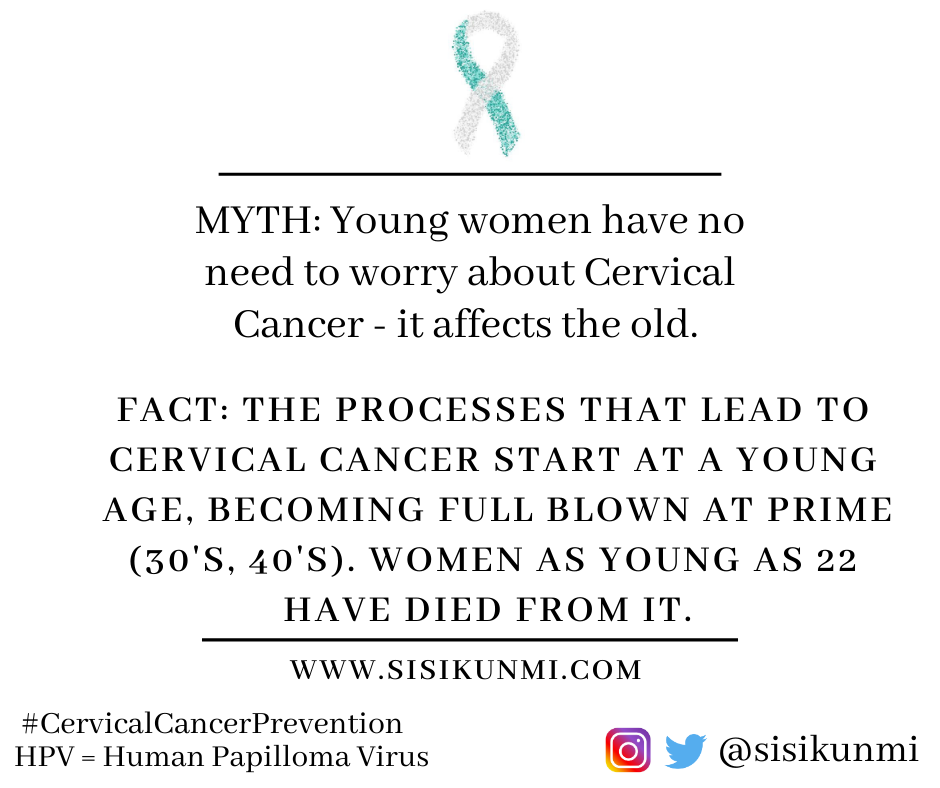
Cervical Cancer mostly affects women in their prime – it has also been shown to affect women in their early twenties. This is why campaigns for more awareness and action towards cervical cancer prevention is so important. No one is ‘too young’.
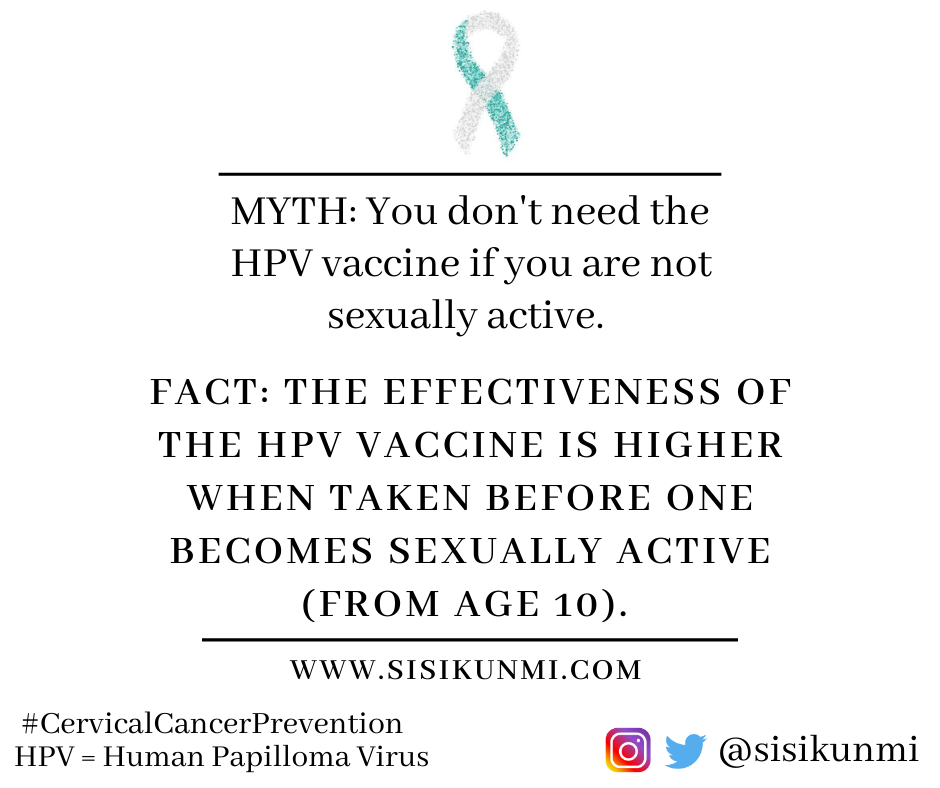
The vaccine is best taken before a person becomes sexually active. This is why it is recommended for children from as young as age 10 to get it.
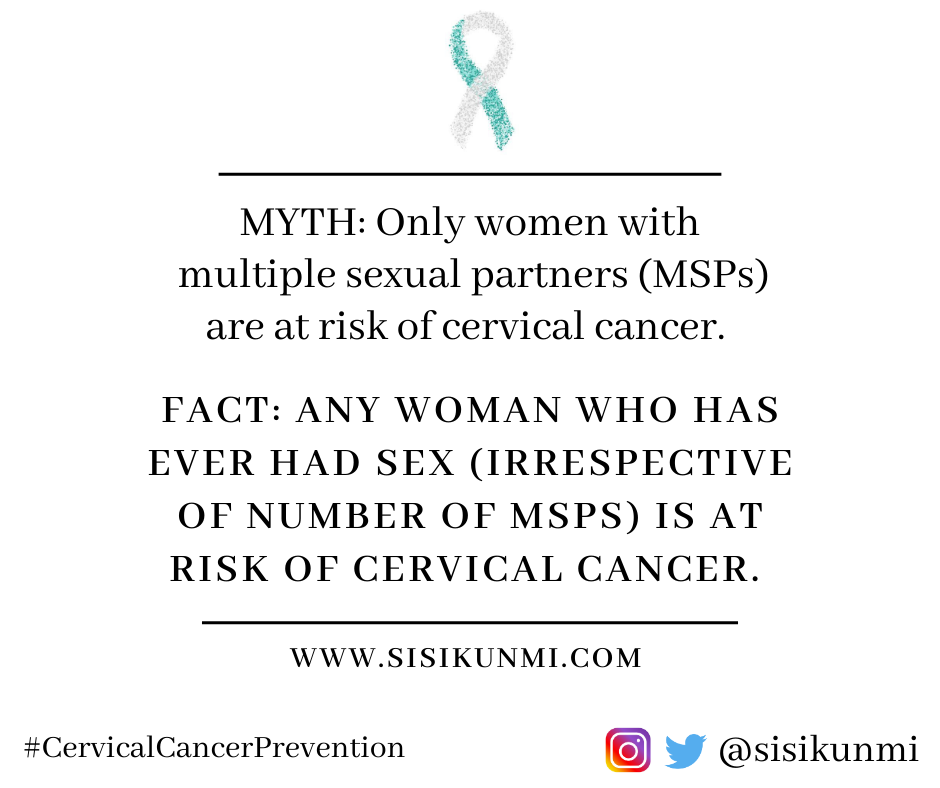
While having multiple sexual partners increases the risk of being infected with HPV and subsequently having cervical cancer, it does not mean someone who has just one partner can not come down with it. The chances are further reduced if both partners were virgins at the time of the meeting and have stayed faithful to each other.
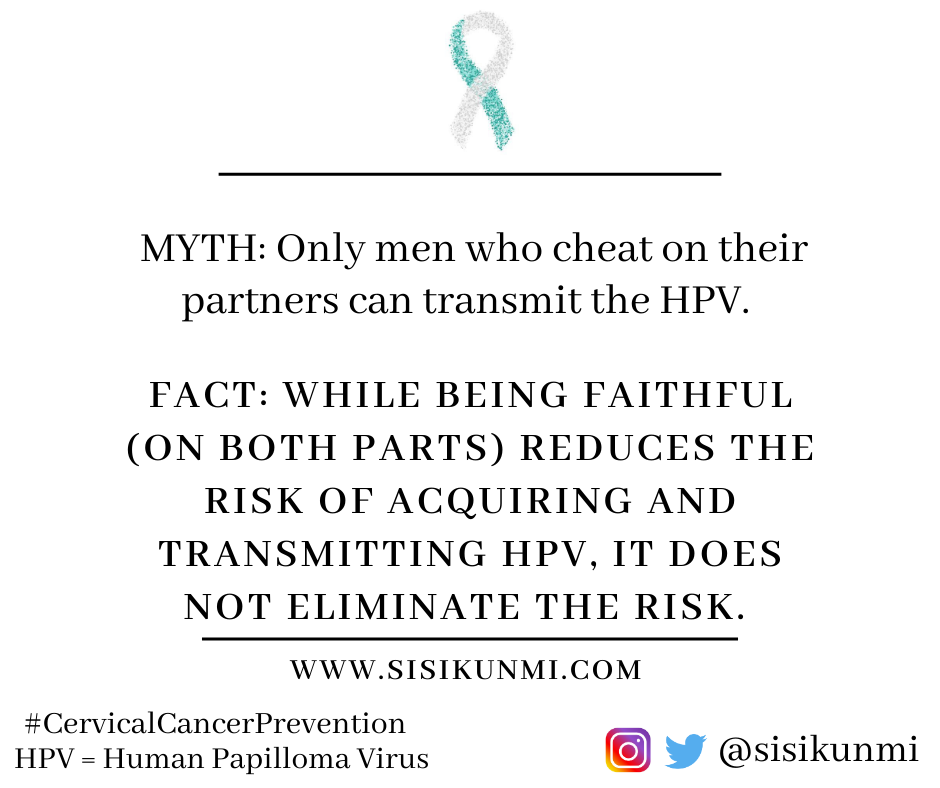
Being faithful decreases the risk of being infected with HPV and consequently, the risk of cervical cancer. However, because both partners might have had sexual relations with other people prior to meeting, they might have been infected with HPV long before.
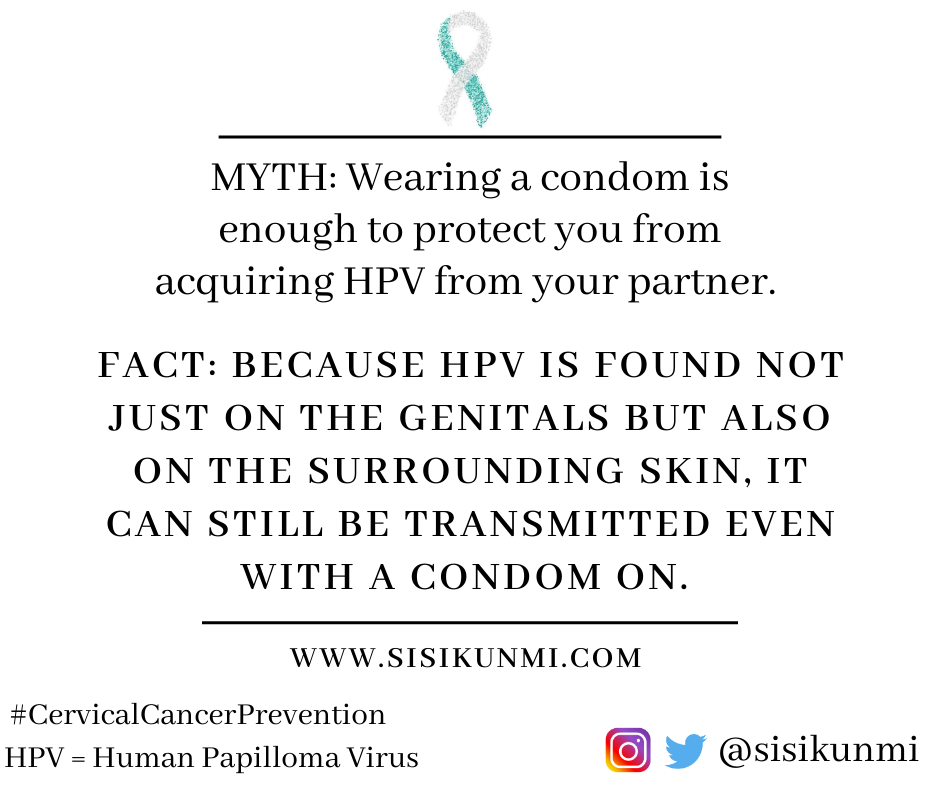
Condoms are not sufficient in preventing the transmission of HPV.
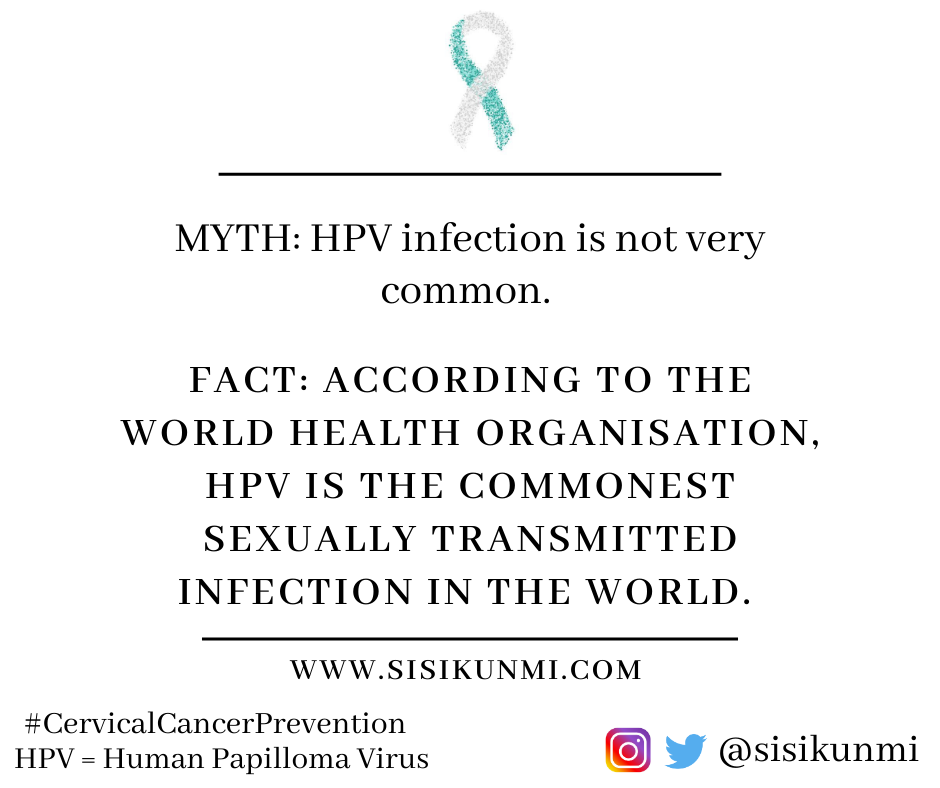
The HPV infection is the commonest sexually transmitted infection in the world. However, most people clear the virus from their system without coming down with any symptoms.
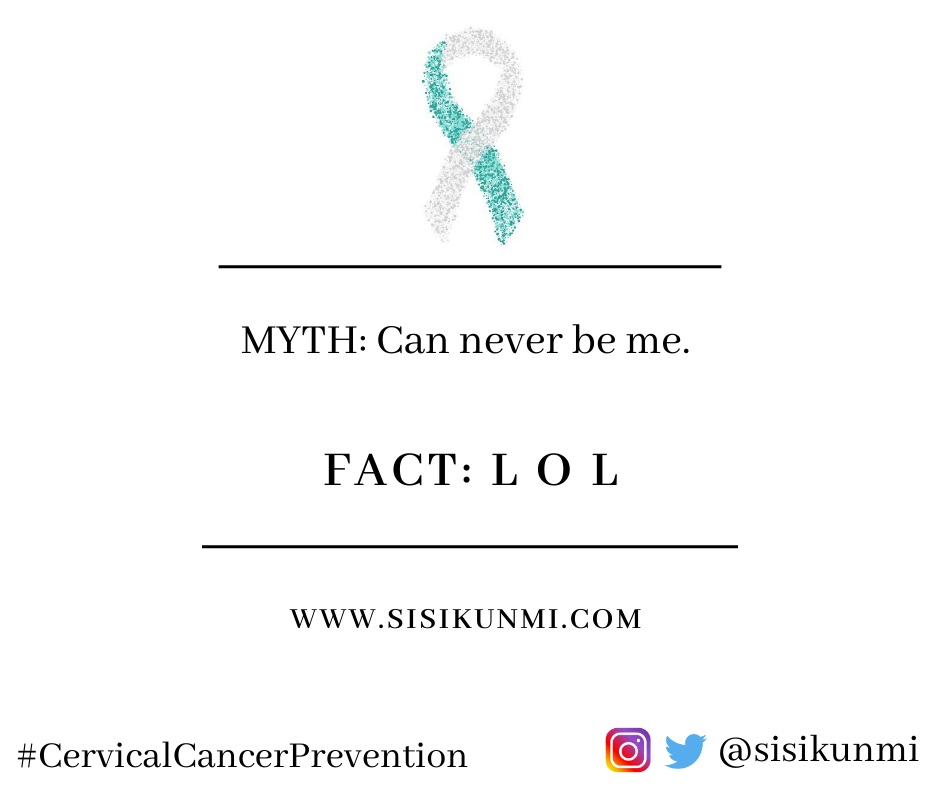
As stated several times in this post, even though some women are at higher risk. Every woman who has been or would be sexually active has some risk of coming down with cervical cancer. This is why vaccination and screening are recommended for all women.
Now that you are aware of how to prevent this deadly disease, it is time to take action. Here is a list of screening centres in Nigeria. Do well to share with your sisters, wives, cousins, friends, bosses and every female around you.
Are you a woman, or do you have women around you who you care about? If you are/do, you should read this post on cervical cancer prevention and then share with them. Click To TweetCheers to being intentional about our health in 2020!
Wishing you premium health,
Sisikunmi



